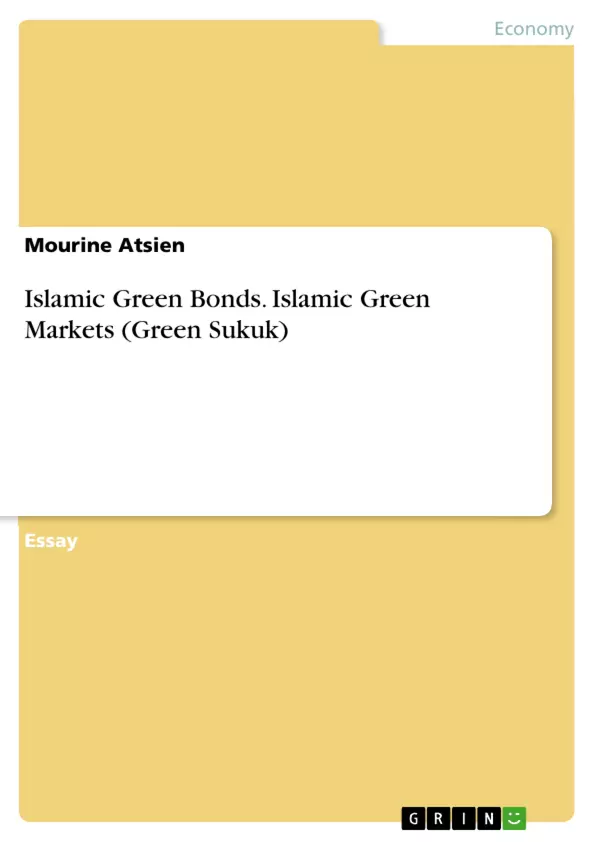Green sukuk is a form of Islamic green finance that helps in mobilisation of funds for green projects. Like conventional sukuk, green sukuk is an asset-based security based on sharia laws and is used mostly in Muslim majority countries to mobilise finances for infrastructure and large-scale developments (Sekuriti, 2019). It is a low-risk, guaranteed return for the investor. These programs provide solutions in areas where financial inclusion is low, as they minimise risk. For instance, they help governments and local authorities to implement sustainable projects or projects aimed at combating climate change such as renewable energy and waste management projects. The use of Sukuk also reduces debt levels by promoting economic security and equality. According to Ng (2015), Sukuk can be restructured to help in the attainment of sustainable development goals by integrating contemporary innovations in financial technology. Consistent with this argument, the OECD (2020) proposed the introduction of the incentive-compatible Sukuk masharakah model in the development of green bonds.
Inhaltsverzeichnis (Table of Contents)
- Islamic Green Markets (Green Sukuk)
- Malaysia's SRI Sukuk Framework
- Indonesia's Green Sukuk Framework
- Sukuk Models for Sustainability Projects
- Social Impact Bonds (SIB) Concept
- The Growth of Islamic Finance in the United Kingdom
- Green Sukuk Framework
Zielsetzung und Themenschwerpunkte (Objectives and Key Themes)
This text explores the application of Islamic finance principles to promote sustainable development through the use of Green Sukuk. It examines the framework and processes for issuing Green Sukuk, highlighting key considerations for investors, issuers, and policymakers.
- The role of Green Sukuk in mobilizing finance for green projects
- Framework and process for issuing Green Sukuk in Malaysia and Indonesia
- The connection between Green Sukuk and Social Impact Bonds (SIB)
- The growth of Islamic finance and its potential for sustainable development
- Key considerations for successful implementation of Green Sukuk programs
Zusammenfassung der Kapitel (Chapter Summaries)
- Islamic Green Markets (Green Sukuk): This chapter introduces the concept of Green Sukuk as a form of Islamic green finance that helps mobilize funds for green projects. It highlights the key features of Green Sukuk, including its asset-based structure, low-risk nature, and alignment with sharia principles.
- Malaysia's SRI Sukuk Framework: This chapter details the framework for SRI Sukuk in Malaysia, focusing on the specific sustainability projects that are eligible for Sukuk issuance, such as renewable energy, environmental protection, and energy conservation. It outlines the issuance process, including utilization of proceeds, eligibility criteria, assessment, and reporting.
- Indonesia's Green Sukuk Framework: This chapter examines the framework for Green Sukuk in Indonesia, comparing and contrasting it with Malaysia's approach. It highlights the key stakeholders involved in the issuance process, illustrating the complex relationships and agreements that govern the use of Green Sukuk.
- Sukuk Models for Sustainability Projects: This chapter explores different models for Sukuk issuance specifically designed for sustainability projects. It highlights the link between the issuer's profit shares and project performance, the use of benchmarks, and the risks associated with Sukuk musharakah.
- Social Impact Bonds (SIB) Concept: This chapter introduces the concept of Social Impact Bonds (SIB) and its relevance to Islamic finance. It explains how SIBs work and how they complement Sukuk in financing projects aimed at addressing social issues and achieving positive social outcomes.
- The Growth of Islamic Finance in the United Kingdom: This chapter discusses the rapid growth of Islamic finance in the United Kingdom, attributing it to several factors and emphasizing the increasing integration of Islamic finance in funding green projects globally.
- Green Sukuk Framework: This chapter focuses on the key elements of a successful Green Sukuk framework, including the use and management of proceeds, external party reviews, and reporting processes. It highlights the need for regulations that consider market needs and the importance of transparency and disclosure for investors.
Schlüsselwörter (Keywords)
Green Sukuk, Islamic finance, sustainable development, green projects, sharia compliance, SRI Sukuk, Social Impact Bonds (SIB), financial inclusion, environmental protection, renewable energy, energy conservation, Malaysia, Indonesia, framework, issuance process, stakeholders, risk-sharing, intergenerational equity.
Frequently Asked Questions: Islamic Green Bonds (Sukuk)
What is Green Sukuk?
Green Sukuk is a form of Sharia-compliant Islamic finance specifically used to mobilize funds for environmentally friendly projects like renewable energy and waste management.
How does Green Sukuk support sustainable development?
It provides a low-risk, asset-based investment vehicle that allows governments and organizations to fund green infrastructure while promoting economic equality and financial inclusion.
What are the main frameworks for Green Sukuk in Southeast Asia?
Malaysia has the SRI (Sustainable and Responsible Investment) Sukuk Framework, and Indonesia has its own Green Sukuk Framework, both focusing on eligible green projects and reporting transparency.
What is the link between Sukuk and Social Impact Bonds (SIB)?
Both instruments aim to fund projects with positive social or environmental outcomes, and they can complement each other in an Islamic finance portfolio to address social issues.
Why is Islamic finance growing in the United Kingdom?
The growth is driven by the UK's position as a global financial hub and increasing interest in integrating ethical and Sharia-compliant principles into green project funding.
- Quote paper
- Mourine Atsien (Author), 2022, Islamic Green Bonds. Islamic Green Markets (Green Sukuk), Munich, GRIN Verlag, https://www.grin.com/document/1326034



